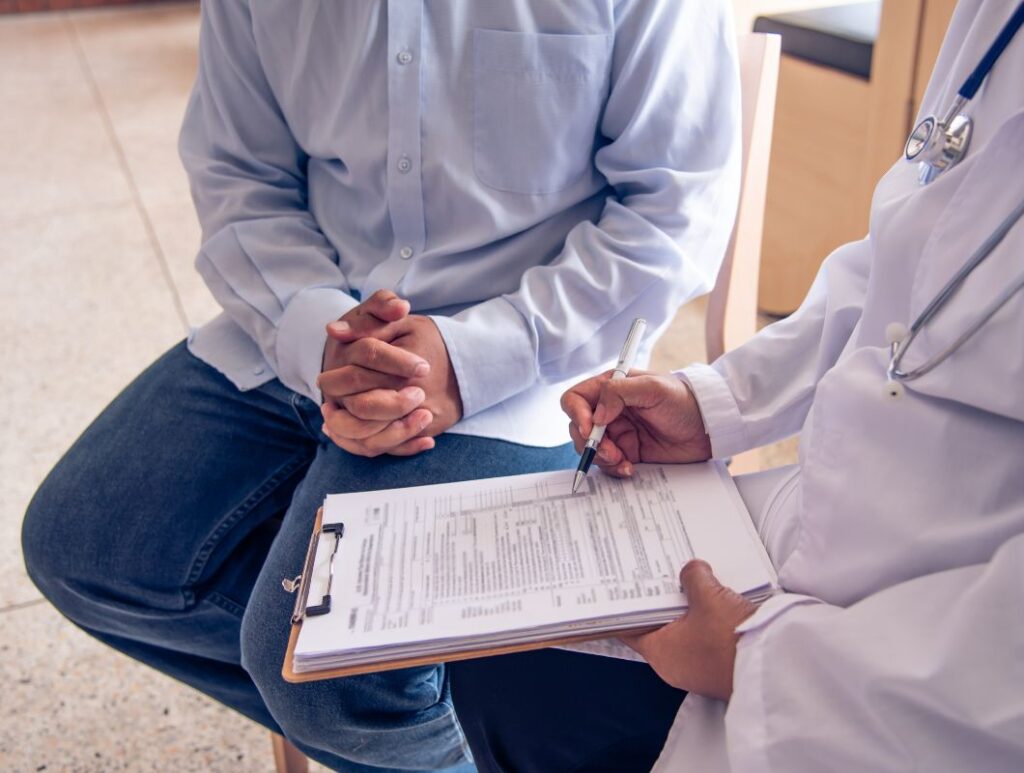Hydrocodone Addiction
Hydrocodone addiction represents a significant challenge in the realm of substance abuse, necessitating comprehensive and tailored treatment approaches. As a powerful opioid medication commonly prescribed for pain relief, hydrocodone has a high potential for misuse and dependency. This introduction explores the key facets of hydrocodone addiction, delving into its prevalence, signs and symptoms, and the crucial role of effective treatment strategies. Understanding the complexities of hydrocodone addiction is essential for fostering awareness, encouraging early intervention, and guiding individuals toward recovery in a supportive and compassionate manner.

What Is Hydrocodone Addiction?
Hydrocodone addiction, marked by opioid use disorder (OUD), is a complex and challenging condition characterized by the compulsive and harmful use of the opioid medication hydrocodone. As a powerful painkiller, hydrocodone alters the brain’s chemistry, leading to physical and psychological dependence. Individuals struggling with addiction may find it difficult to control their drug use despite adverse consequences on their health, relationships, and daily life. Hydrocodone addiction is often marked by a persistent urge to obtain and use the drug, even in the face of escalating risks. Understanding the nature of hydrocodone addiction is crucial for developing effective interventions and support systems to help individuals break free from the cycle of dependency and embark on a path to recovery.
According to the DSM-V, the following criteria determine drug addiction:
- Taking larger amounts or taking drugs over a longer period than intended.
- Persistent desire or unsuccessful efforts to cut down or control opioid use.
- Spending a great deal of time obtaining or using the opioid or recovering from its effects.
- Craving, or a strong desire or urge to use opioids.
- Problems fulfilling obligations at work, school, or home.
- Continued opioid use despite having recurring social or interpersonal problems.
- Giving up or reducing activities because of opioid use.
- Using opioids in physically hazardous situations.
- Continued opioid use despite ongoing physical or psychological problems likely to have been caused or worsened by opioids.
- Tolerance (i.e., need for increased amounts or diminished effect with continued use of the same amount).
Understanding these criteria is essential for recognizing the complexities of opioid addiction and facilitating informed discussions around effective intervention and treatment strategies.
If you or someone you know is struggling with hydrocodone abuse, please reach out for help today.
What Are the Signs and Symptoms of Hydrocodone Addiction?
Oxycodone addiction manifests through a spectrum of signs and symptoms, encompassing physical, behavioral, and psychological aspects. Recognizing these indicators is crucial for early intervention and support:
Physical Signs:
- Constricted Pupils: Hydrocodone use often results in pinpoint pupils.
- Slurred Speech: Impaired motor function can lead to difficulties in articulation.
- Drowsiness: Excessive sleepiness or nodding off may be noticeable.
- Nausea and Vomiting: Gastrointestinal disturbances are common side effects.
Behavioral Signs:
- Social Withdrawal: Individuals may isolate themselves from family and friends.
- Secrecy: Attempts to hide drug use, including secretive behaviors.
- Impaired Coordination: Observable challenges in physical coordination and movement.
- Financial Issues: Spending significant money on obtaining and using hydrocodone.
Psychological Signs:
- Mood Swings: Fluctuations in mood, including irritability and euphoria.
- Anxiety or Depression: Hydrocodone abuse can contribute to mood disorders.
- Impaired Judgment: Difficulty making sound decisions and assessing risks.
- Cravings: Strong urges and desires to use hydrocodone persistently.
Hydrocodone Addiction Facts & Statistics
Hydrocodone addiction is a pressing concern in the realm of substance abuse, contributing to a complex web of health and societal challenges. Here are a few key facts:
- Hydrocodone, a potent opioid, is widely prescribed for pain management, contributing to its prevalence.
- The National Survey on Drug Use and Health (NSDUH) highlights the significant misuse of prescription opioids, including hydrocodone, in the United States.
- According to the Substance Abuse and Mental Health Services Administration (SAMHSA), an estimated 1.6 million people aged 12 or older misused hydrocodone products in 2020.
- The opioid crisis has intensified concerns, with hydrocodone contributing to a substantial portion of opioid-related overdose deaths.
- Awareness of the prevalence and risks associated with hydrocodone misuse is crucial for addressing the broader issue of opioid addiction.
Why Is Hydrocodone Dangerous?
Hydrocodone poses significant dangers due to its potential for abuse and adverse health effects. As an opioid, it carries a high risk of addiction, leading individuals down a path of dependence and withdrawal. Overuse or misuse can result in respiratory depression, a life-threatening condition where breathing becomes dangerously slow. Combining hydrocodone with other substances, especially alcohol, amplifies these risks. The euphoric effects that make it addictive also contribute to its danger, as users may escalate dosage seeking the initial high. The combination of physical risks, addiction potential, and the risk of overdose underscores the dangerous nature of hydrocodone.
Self-Assessment: Am I Addicted?
Hydrocodone Addiction and Mental Health Disorders
Hydrocodone addiction often intertwines with mental health disorders, creating a complex and challenging situation for individuals. The euphoric effects of hydrocodone can provide temporary relief from emotional distress, leading some individuals to self-medicate. However, prolonged use can exacerbate underlying mental health issues or even trigger the onset of psychiatric disorders. Anxiety, depression, and mood swings are common co-occurring conditions with hydrocodone addiction. Individuals may initially turn to hydrocodone to numb emotional pain, but the substance’s impact on neurotransmitters can contribute to mental health deterioration.
Moreover, the cycle of drug addiction can lead to increased stress, isolation, and strained relationships, further impacting mental well-being. Effective treatment for hydrocodone addiction often involves addressing both substance use and underlying mental health concerns concurrently. Integrated approaches, including counseling, therapy, and psychiatric support, aim to provide comprehensive care for individuals struggling with hydrocodone addiction and its interconnected impact on mental health. Understanding this complex relationship is crucial for tailoring effective treatment strategies and promoting lasting recovery.
Have any questions?
When Do You Need Hydrocodone Addiction Treatment?
If you are wondering if your hydrocodone use has escalated to a full-fledged addiction, here are some warning signs:
- Increasing Tolerance: If you find yourself needing higher doses of hydrocodone to achieve the same effects, it could indicate the development of tolerance, signaling the need for intervention.
- Persistent Cravings: Frequent and intense cravings for hydrocodone, coupled with difficulty resisting the urge to use, may suggest the onset of addiction, prompting consideration for treatment.
- Interference with Daily Life: If hydrocodone use disrupts your ability to fulfill responsibilities at work, home, or socially, seeking treatment becomes crucial to restore balance and functionality.
- Physical Health Deterioration: Noticeable physical health decline, such as respiratory issues, gastrointestinal problems, or other hydrocodone-related health issues, should prompt immediate attention and a comprehensive treatment plan.
- Failed Attempts to Quit: If attempts to quit or reduce hydrocodone use have been unsuccessful, it indicates a loss of control over the substance, necessitating professional help for addiction treatment.
Recognizing these signs is pivotal in determining when hydrocodone addiction treatment is needed. Early intervention enhances the likelihood of successful recovery, addressing both the physical dependence and underlying factors contributing to addiction.
How Long Is Hydrocodone Addiction Treatment?
The duration of hydrocodone addiction treatment varies based on individual needs and progress. Typically, treatment encompasses different levels of care, including detoxification, residential or inpatient rehabilitation, intensive outpatient programs, and ongoing outpatient support. Detoxification, the initial phase, usually lasts a week to address the physical dependence on hydrocodone. Following this, the rehabilitation phase, which may include therapies, counseling, and skill-building, can extend from 30 days to several months.
The length of treatment is often personalized, considering factors like the severity of addiction, the presence of co-occurring mental health disorders, and the individual’s response to interventions. Long-term recovery may involve ongoing therapy, support groups, and aftercare programs to sustain positive outcomes. The goal is to ensure individuals receive comprehensive care tailored to their unique needs, promoting sustained recovery from hydrocodone addiction.
Hydrocodone Addiction Treatment at Royal Life Centers
Hydrocodone addiction treatment at Royal Life Centers prioritizes a client-centered and holistic approach to recovery. With a focus on individual needs, their comprehensive programs include:
- Medical Detoxification: Safely managing withdrawal symptoms under medical supervision.
- Inpatient Rehabilitation: Intensive residential treatment addressing the physical, mental, and emotional aspects of addiction.
- Individual Counseling: Tailored therapy sessions to explore underlying issues and develop coping strategies.
- Group Therapy: Supportive environments fostering connection and shared experiences.
- Medication-Assisted Treatment (MAT): Research-based medications to aid recovery.
- Aftercare Planning: Ensuring a smooth transition into ongoing support and relapse prevention.
Are you looking for help with addiction? Let us support you on the path to lasting recovery
Hydrocodone Addiction Treatment in Washington State
Hydrocodone addiction treatment in Washington State embraces a multidimensional approach to address the complex nature of substance dependence. With a focus on personalized care, treatment options include:
- Inpatient Rehabilitation: Comprehensive programs within a residential setting offering structured therapies.
- Outpatient Programs: Flexible treatment plans allowing individuals to receive care while maintaining daily responsibilities. resisting the urge to use, may suggest the onset of addiction, prompting consideration for treatment.
- Counseling Services: One-on-one sessions to explore personal challenges and promote emotional healing.
- Support Groups: Community-based forums fostering shared experiences and mutual encouragement.
- Medication-Assisted Treatment (MAT): Research-based pharmaceutical support integrated into recovery plans.
In Washington State, addiction treatment providers prioritize creating a supportive and understanding environment, recognizing that each individual’s journey to recovery is unique. The integration of various therapeutic modalities ensures a comprehensive and tailored approach to address the diverse needs of those seeking assistance in overcoming hydrocodone addiction.
If you or someone you know is struggling with hydrocodone addiction, Royal Life Centers is here to help. Contact us today to start your journey to recovery.
If you would like to learn more Other Resources
Looking for Hydrocodone Addiction Treatment Services?
If you or someone you love is struggling with Hydrocodone addiction, please reach out to us to find out more about how our hydrocodone detox services can help. We work with most private insurance policies and we have affordable self-pay rates if you do not have insurance. Give us a call and we will figure out the best treatment plan for you or your loved one.
Because We Care.

Would you like more information?
If you or someone you know has a substance use disorder, we hope you’ll begin your journey with us at Royal Life Centers.
Change your life with one call.
We can help.












